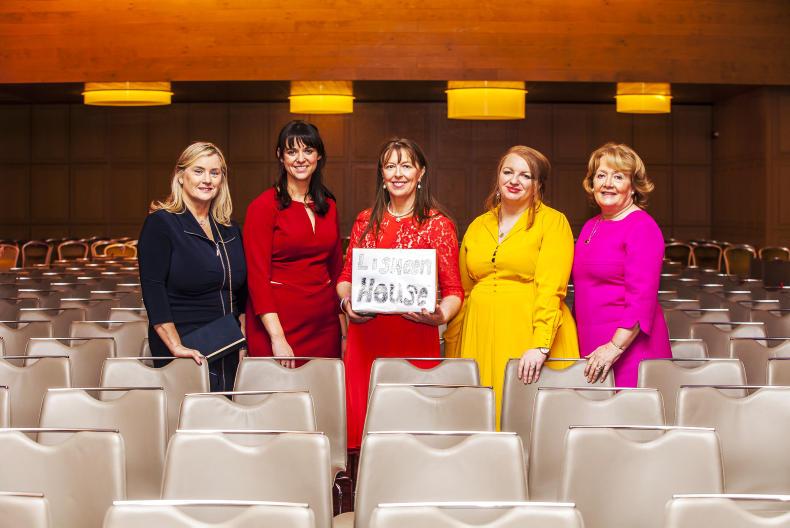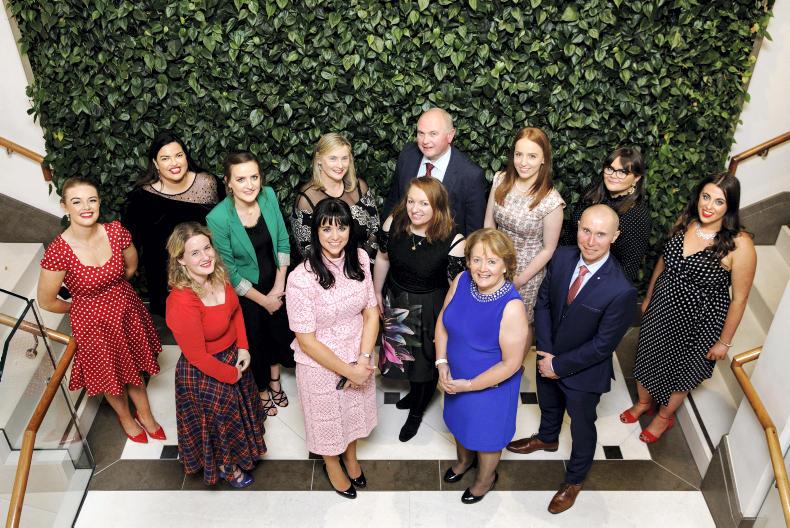Last year was my first year attending the Women and Ag Conference as editor of Irish Country Living. I was literally blown away by the speakers and the attendees – their passion for the event and their compassion for each other, evidenced in the wave of monetary support that was collected and given to Lisheens House founder Noreen Murphy. Also praise must be extended to my own team in Irish Country Living in terms of how they pulled it together. And let’s not forget the dancing.
This is a monster event, the biggest gathering of women, (and a few men) to take place in the country and we are very proud of it and what it delivers. Although the conference itself is still in the planning stages, this year we are extending the coverage of Women and Ag in Irish Country Living with a dedicated page every week from now until the conference in Sligo in October. We are thrilled to have FBD Insurance as our partner once again this year, without them it would be impossible to stage an event of this magnitude.
We want to extend this conference beyond the October event and have women working in agriculture front and centre in our publication every week. We have a plan in place and I am really excited for the content that is coming up. We will have something for everyone from interviews with dedicated attendees on why they keep coming back to women specific features, right up to our speaker profiles as we get closer to the event itself.

We have 140,000 family farms in Ireland, so I argue that the quoted figure of 12% women farmers is not reflective of the contribution that women make to farms across this country. The National Rural Network carried out a study in 2013 which showed that 70,000 female farmers were responsible for in the region of 35,000 work units. Although this research was carried out a number of years ago, the findings still ring true that this work and contribution to Irish farms is mainly unaccounted for. In Ireland, the farm household remains the social unit that manages the farm enterprises. And although the question of accurately recording women’s farm labour has not been resolved, the issue has changed in that on many farms it is women’s work outside of the farm that now subsidises that farm. Teagasc has previously estimated that 29% of farms are “sustainable” due to the presence of an off-farm income. This off-farm employment can bring skills to farm enterprises also that can add value not just to farm businesses but to farm organisations and the agri-industry in general.
You are important
Women also have some responsibility for their work not being recorded or appreciated through suggestions that, “I only stand in a gap”. Women need to be proud of their contribution to the farm and to the industry. That isn’t necessarily milking cows or measuring grass, it is all the other things such as helping with quality assurance, ensuring that they and their kin buy Irish, speaking in positive terms about the product that the sector produces and educating the consumers of the future – their children.
Speaking up for our industry has never been more important as we combat negative commentary about our industry
Furthermore, there is an emerging diversity of industries within the sector and although the production of home produce had dissipated somewhat over the years, Irish Country Living features innovative rural entrepreneurs every week. These women and men are fighting back.
Speaking up for our industry has never been more important as we combat negative commentary about our industry. Over the past year, I have found myself researching, exploring and speaking about the reasons why women are not more prominent on farms and in farm organisations more and more as chair of the Irish Farmers Association (IFA) diversity committee. Opinions on this issue are wide ranging and what works to increase gender diversity in one segment of the population will not work elsewhere.
There has been a massive change in the IFA over the last two years, but unfortunately today apart from at the national council level – where there is an unprecedented seven female county chairs – women are still poorly represented across the organisation. Furthermore, although positive today, the diversity evident at national council level could once again dissipate.
Farmers do not hold the sympathetic eye of the general public as much as they once did
The organisation, however, is embracing change and if approved the recommendations put forward, including the formation of a permanent diversity project team, will continuously address the different forms of diversity as it manifests into the future.
But why is this important, that women speak up? Because the world has changed. Farmers do not hold the sympathetic eye of the general public as much as they once did. The expectation of the consumer is higher and very different and as we become an increasingly urbanised nation, a larger percentage of the population are many times more removed from the farmgate than here-to-fore.
Women are needed in the agri-industry, farming, diversifying, shopping, advising and being the face and voice that consumers will relate to
Many people are losing the connection between the activity carried out year-round by farmers all over our country and the food that they consume every day. Consumers are diverse, their concerns and worries are diverse and they are not relating to the farming community as much as they did in the past. Women are needed in the agri-industry, farming, diversifying, shopping, advising and being the face and voice that consumers will relate to.
We are looking forward to producing this content in support of the amazing women in our sector. This, however, is your event, our readers, so any feedback or suggestions that you may have would be appreciated. We want to make this conference, our 12th, the best year ever.
Read more
Women and Agriculture Conference: women's roles in farming organisations
Critical women are involved in agribusiness as they recognise consumer trends
Last year was my first year attending the Women and Ag Conference as editor of Irish Country Living. I was literally blown away by the speakers and the attendees – their passion for the event and their compassion for each other, evidenced in the wave of monetary support that was collected and given to Lisheens House founder Noreen Murphy. Also praise must be extended to my own team in Irish Country Living in terms of how they pulled it together. And let’s not forget the dancing.
This is a monster event, the biggest gathering of women, (and a few men) to take place in the country and we are very proud of it and what it delivers. Although the conference itself is still in the planning stages, this year we are extending the coverage of Women and Ag in Irish Country Living with a dedicated page every week from now until the conference in Sligo in October. We are thrilled to have FBD Insurance as our partner once again this year, without them it would be impossible to stage an event of this magnitude.
We want to extend this conference beyond the October event and have women working in agriculture front and centre in our publication every week. We have a plan in place and I am really excited for the content that is coming up. We will have something for everyone from interviews with dedicated attendees on why they keep coming back to women specific features, right up to our speaker profiles as we get closer to the event itself.

We have 140,000 family farms in Ireland, so I argue that the quoted figure of 12% women farmers is not reflective of the contribution that women make to farms across this country. The National Rural Network carried out a study in 2013 which showed that 70,000 female farmers were responsible for in the region of 35,000 work units. Although this research was carried out a number of years ago, the findings still ring true that this work and contribution to Irish farms is mainly unaccounted for. In Ireland, the farm household remains the social unit that manages the farm enterprises. And although the question of accurately recording women’s farm labour has not been resolved, the issue has changed in that on many farms it is women’s work outside of the farm that now subsidises that farm. Teagasc has previously estimated that 29% of farms are “sustainable” due to the presence of an off-farm income. This off-farm employment can bring skills to farm enterprises also that can add value not just to farm businesses but to farm organisations and the agri-industry in general.
You are important
Women also have some responsibility for their work not being recorded or appreciated through suggestions that, “I only stand in a gap”. Women need to be proud of their contribution to the farm and to the industry. That isn’t necessarily milking cows or measuring grass, it is all the other things such as helping with quality assurance, ensuring that they and their kin buy Irish, speaking in positive terms about the product that the sector produces and educating the consumers of the future – their children.
Speaking up for our industry has never been more important as we combat negative commentary about our industry
Furthermore, there is an emerging diversity of industries within the sector and although the production of home produce had dissipated somewhat over the years, Irish Country Living features innovative rural entrepreneurs every week. These women and men are fighting back.
Speaking up for our industry has never been more important as we combat negative commentary about our industry. Over the past year, I have found myself researching, exploring and speaking about the reasons why women are not more prominent on farms and in farm organisations more and more as chair of the Irish Farmers Association (IFA) diversity committee. Opinions on this issue are wide ranging and what works to increase gender diversity in one segment of the population will not work elsewhere.
There has been a massive change in the IFA over the last two years, but unfortunately today apart from at the national council level – where there is an unprecedented seven female county chairs – women are still poorly represented across the organisation. Furthermore, although positive today, the diversity evident at national council level could once again dissipate.
Farmers do not hold the sympathetic eye of the general public as much as they once did
The organisation, however, is embracing change and if approved the recommendations put forward, including the formation of a permanent diversity project team, will continuously address the different forms of diversity as it manifests into the future.
But why is this important, that women speak up? Because the world has changed. Farmers do not hold the sympathetic eye of the general public as much as they once did. The expectation of the consumer is higher and very different and as we become an increasingly urbanised nation, a larger percentage of the population are many times more removed from the farmgate than here-to-fore.
Women are needed in the agri-industry, farming, diversifying, shopping, advising and being the face and voice that consumers will relate to
Many people are losing the connection between the activity carried out year-round by farmers all over our country and the food that they consume every day. Consumers are diverse, their concerns and worries are diverse and they are not relating to the farming community as much as they did in the past. Women are needed in the agri-industry, farming, diversifying, shopping, advising and being the face and voice that consumers will relate to.
We are looking forward to producing this content in support of the amazing women in our sector. This, however, is your event, our readers, so any feedback or suggestions that you may have would be appreciated. We want to make this conference, our 12th, the best year ever.
Read more
Women and Agriculture Conference: women's roles in farming organisations
Critical women are involved in agribusiness as they recognise consumer trends







 This is a subscriber-only article
This is a subscriber-only article









SHARING OPTIONS: